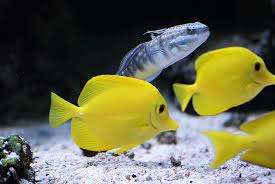This pertains to SALT WATER fish.
Freshwater dips. I want you to be cognizant of the following about that procedure.
* 1) Fish vary in the amount of time it takes for them to become stressed by the freshwater dip. Some marine fish seem to actually like dipping. Others become weak and near death in as few as 1-2 minutes, so alertness is the keyword.
A minimum dip, if the fish seems to be doing fine and you are bored waiting, is 7-8 minutes. It has been shown that 7-8 minutes is enough time to clear the fishes’ surface of parasites. But you have no choice if the fish appears stressed before that time: Remove him.
* 2) Use water that is dechlorinated by time, or by chemical dechlorination.
* 3) Use water that is the same temperature as the system, or mother tank.
* 4) Use water that has the same pH as the mother system, eg about 8.3-8.5
I routinely keep a Marine Buffer or African Cichlid buffer on hand for buffering the pH of freshwater dips on my marine specimens.
* 5) After the dip, do not dump the dip water back into the tank. It is said that loosened parasites can be revived upon return to the marine environment, and in the case of Trematodes, (Black Ich) I could see this happening. Trematodes may be better handled with PraziPro.
* 6) Dips should be done daily or every other day depending upon the fishes’ response to it. If the fish is very weak, every other day may be all it can stand, but if still strong, daily affords more complete parasite eradication.
You will be dipping for a 14 day period, so get out your galoshes.
If you treat with copper, and can confirm that you have maintained the copper level at 0.2 ppm, and the fish is still not well, then stray voltage may be playing in the case.






